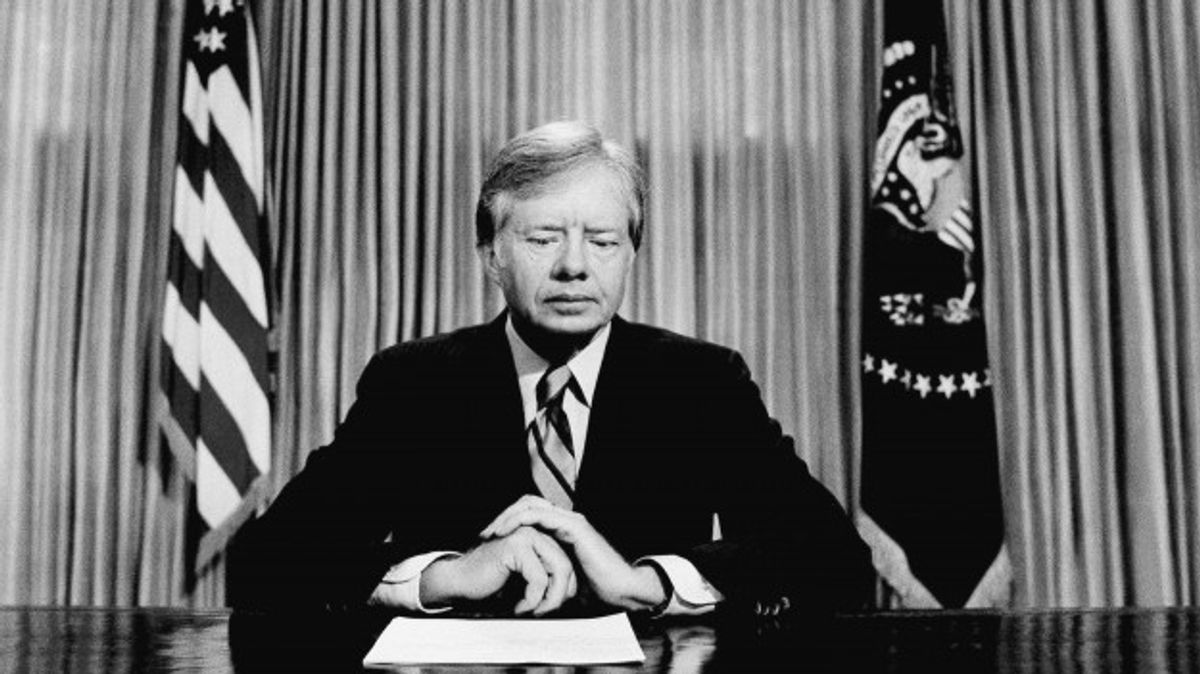President Jimmy Carter announced sanctions against Iran in 1980, including the cancellation of visas for Iranian citizens.
Carter's sanctions were equivalent to Donald Trump's suggestion that Muslims be banned from entering or immigrating to the U.S.
Following the 2 December 2015 mass shooting in San Bernardino, California, Republican presidential candidate Donald Trump controversially suggested (temporarily) barring all Muslims from entering the United States. During the ensuing debate over Trump's pronouncement, several web sites said that Trump's suggestion followed a precedent set by President Jimmy Carter barring Iranian nationals from entering the U.S. during the Iran Hostage Crisis of 1980.
One such comparison was made in an 8 December 2015 Frontpage Mag article titled "Carter Banned Iranians from Coming to US During Hostage Crisis: Trump is Just Like Hitler. Or Jimmy Carter," which held that:
Trump is a monster, a madman and a vile racist. He's just like Hitler. Or Jimmy Carter.
During the Iranian hostage crisis, Carter issued a number of orders to put pressure on Iran. Among these, Iranians were banned from entering the United States unless they oppose the Shiite Islamist regime or had a medical emergency.
Apparently barring people from a terrorist country is not against "our values" after all. It may even be "who we are". Either that or Carter was a racist monster just like Trump.
The claim quickly spread online, primarily among people who favored Trump's proposed restrictions on Muslim immigration. Web sites spreading the claim referenced a 7 April 1980 announcement by Carter titled "Sanctions Against Iran Remarks Announcing U.S. Actions" and highlighted a portion of those remarks:
Fourth, the Secretary of Treasury [State] and the Attorney General will invalidate all visas issued to Iranian citizens for future entry into the United States, effective today. We will not reissue visas, nor will we issue new visas, except for compelling and proven humanitarian reasons or where the national interest of our own country requires. This directive will be interpreted very strictly.
President Carter had opted to impose sanctions on Iran, which included a cessation of diplomatic relations, a prohibition on trade, assessment of previously-frozen Iranian Government assets, the cancellation of Iranian-U.S. visas, and a moratorium on new visas (with exceptions for humanitarian and otherwise compelling situations) in response to Iranian terrorists' having invaded the U.S. Embassy in Tehran five months earlier and taken 50 American citizens hostage:
Ever since Iranian terrorists imprisoned American Embassy personnel in Tehran early in November, these 50 men and women — their safety, their health, and their future — have been our central concern. We've made every effort to obtain their release on honorable, peaceful, and humanitarian terms, but the Iranians have refused to release them or even to improve the inhumane conditions under which these Americans are being held captive.
The events of the last few days have revealed a new and significant dimension in this matter. The militants controlling the Embassy have stated they are willing to turn the hostages over to the Government of Iran, but the Government has refused to take custody of the American hostages. This lays bare the full responsibility of the Ayatollah Khomeini and the Revolutionary Council for the continued illegal and outrageous holding of the innocent hostages. The Iranian Government can no longer escape full responsibility by hiding behind the militants at the Embassy.
Stripped of context (and if readers squinted very hard), President Carter's remarks bore a passing resemblance to Donald Trump's proposal. However, while Carter's action involved a well-defined class of persons (Iranian citizens) being denied entry to the U.S. until a well-defined goal was achieved (the hostages were released), Trump's suggestion was ill-defined in scope and purpose: the latter advocated a “total and complete shutdown of Muslims entering the United States" (which could apply to persons from any country in the world and would require making subjective estimations about their religious beliefs) "until our country's representatives can figure out what is going on" (a vague and unintelligible goal).
Carter explicitly outlined the reasons behind the issuance of sanctions (including visa cancellation for Iranian nationals) and underscored his intent to apply pressure to Iran's government release American hostages. By contrast, Trump's proposal was markedly different: not a sanction, but a security measure framed as a counterterrorism strategy, and one directed at all adherents of a particular religion (regardless of their nationalities) rather than citizens of a particular country. Moreover, Carter's sanctions occurred during a lengthy period of escalating conflict between Iran and the United States (during which U.S. hostages remained in foreign captivity), but Trump's proposal was issued in response to a mass shooting perpetrated by an American citizen and his immigrant wife.
Carter's sanctions were applied to Iranian nationals as part of a clear objective to secure the release of the U.S. hostages without military intervention, whereas Trump's suggestion applied to a far broader cross-section of visa applicants, which he described as a measure to prevent terrorist attacks. Historically, Carter's sanctions bore closer resemblance to Kennedy administration-era sanctions on Cuba [PDF, PDF] than Trump's anti-immigration plan.

